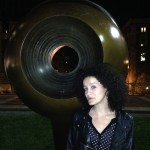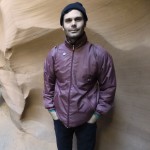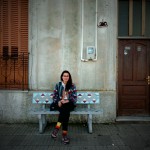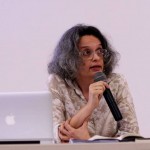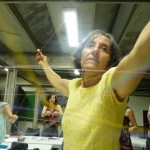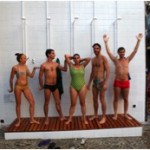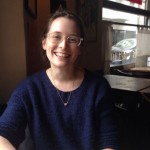Artist Intervention | Conference Co-Organizers
Panel 1:
Insurgent Bodies, Subaltern Spaces
George Flaherty
Assistant Professor, Art History
Associate Director, Center for Latin American Visual Studies
Department of Art and Art History, University of Texas at Austin
George Flaherty specializes in Latin American and Latino visual and spatial cultures since 1940, with additional research interests in film and media studies and postcolonial theory. He is close to completing a book manuscript that explores the spatial dimensions of the 1968 student movement and Tlatelolco massacre in Mexico City and their representation, tentatively titled Hotel de Mexico: Hospitality and Dwelling on 1968. George’s research has been supported by the Center for Advanced Study in the Visual Arts (National Gallery of Art, Washington), Getty Foundation, Social Science Research Council, Society of Architectural Historians, and a Fulbright-García Robles grant to Mexico, where he was a visiting scholar at the Instituto de Investigaciones Estéticas of the Universidad Nacional Autónoma de México. His essays and reviews have appeared in Journal of the Society of Architectural Historians, History of Photography, Desafio de la estabilidad: procesos artísticos en México, 1952-1967 (MUAC 2014), and Latin American Modern Architectures: Ambiguous Territories (Routledge 2012). He has also contributed to curatorial projects at the Harry Ransom Center, Autry National Center and the Santa Barbara Museum of Art.
Sujatha Fernandes
Associate Professor, Sociology
Queens College and the Graduate Center, City University of New York
Sujatha Fernandes is an Associate Professor of Sociology at Queens College and the Graduate Center, City University of New York. She is the author of Who Can Stop the Drums? Urban Social Movements in Chávez’s Venezuela (Duke University Press, 2010) and Cuba Represent! Cuban Arts, State Power, and the Making of New Revolutionary Cultures (Duke University Press, 2006). Her most recent book, Close to the Edge: In Search of the Global Hip Hop Generation (Verso, 2011), has been reprinted in Australian, Chinese, and Italian editions. Her writing has appeared in academic journals and popular forums, including The New York Times, The Nation, and The Huffington Post. (www.sujathafernandes.com)
Agnese Codebò
PhD Candidate
Department of Latin American and Iberian Cultures
Columbia University
Agnese Codebò is currently working on her PhD dissertation on the intertwining of architecture, urban plans, and aesthetical representations of poverty in Latin America’s Southern Cone from the last decade of the nineteenth-century to the present.
Joaquín Barriendos
Assistant Professor, Department of Latin American and Iberian Cultures
Columbia University
Joaquín Barriendos teaches Latin American Cultural Studies at Columbia University. He has been fellow-researcher at the Institute National d’Histoire de l’Art, and visiting-researcher in the Program in Museum Studies (New York University). His current courses examine the interplays between visuality and contemporary Latin American art, with an emphasis on social movements, artists networks, geopolitics of art, visual translatability, conceptualist practices, and institutional critique. Professor Barriendos is a member of the International Association of Art Critics, serves as a member of ILAS’ Executive Committee, collaborates with the Visual Culture in Europe Network, and is Chief Academic Curator of the Juan Acha Archive. His book “Geoestética y transculturalidad” was awarded in 2007 the annual prize on art theory, conferred by the Fundació Espais d’Art Contemporani. In 2010 he was commissioned to edit a multi-authored book, “Global Circuits: The Geography of Art and the New Configurations of Critical Thought”. His current research interests include Latin American Art Archives, Memory and Museum Studies, Critical Human Rights, Geopolitics of Global Art, and Postcolonial Cultural Diplomacy.
Panel 2:
Urban Interventions, Ephemeral Poetics
Arden Decker
PhD Candidate, Art History
The Graduate Center of the City University of New York
Arden Decker is a doctoral candidate in Art History at the Graduate Center of the City University of New York. She has been a fellow at the Smithsonian Latino Museum Studies Program in Washington D.C. and in 2011-2012 she was the recipient of a Fulbright-García Robles award for dissertation research in Mexico City. She has assisted on numerous exhibitions including Arte ≠ Vida: Actions by Artists of the Americas 1960-2000 at El Museo del Barrio, NYC and last year published a roundtable interview for the exhibition catalogue México: Inside/Out, produced by the Modern Art Museum of Fort Worth. She is also a participant in the Primer Seminario de Investigación y Curaduría: Tecnología, medios audiovisuales y experimentación artística at the Centro de la Imagen, Mexico City.
Currently, she is completing her dissertation examining the development of conceptual practices in Mexico during the 1960s and 1970s. The project centers around ephemeral interventions, anti-exhibitions, and institutional critique in the work of artists ranging from Alejandro Jodorowsky to the subversive and collaborative art groups of the 1970s now known as los grupos.
Erin Aldana
Independent Curator and Scholar
Erin Aldana is a curator and art historian currently based in San Diego, California. She specializes in modern and contemporary Latin American art. Her research explores the emergence of urban interventions, experimental printmaking, and otherwise “marginal” forms of art in Brazil during the 1970s. She has taught at the University of California, San Diego, UC Irvine, the University of Texas at Austin, and Southwestern University. She has published articles on Latin American art and film in The Geometry of Hope: Latin American Abstract Art from the Patricia Phelps de Cisneros Collection, Art Nexus, CAA Reviews, Social Identities, and Third Text. She is a 2014 recipient of the Warhol Foundation Arts Writers grant for the exhibition catalog for the show “Xerox Art in Brazil and Argentina, 1970-1980,” which has also received a research and planning grant from the Getty Foundation as part of its “Pacific Standard Time: LA/LA” initiative.
Abigail Lapin
Doctoral Student, Art History
The Graduate Center of the City University of New York
Abigail Lapin Dardashti is a Ph.D. student in Art History at the CUNY Graduate Center. Her research focuses on issues of race and religion in twentieth century art of the Americas, with a concentration on Dominican Republic and Brazil. Most recently, she received a fellowship at the Smithsonian American Art Museum to study the work of contemporary Dominican American artists who re-evaluate blackness in the Dominican Republic from a U.S. post-civil rights perspective.
Guisela Latorre
Associate Professor, Department of Women’s, Gender, and Sexuality Studies
The Ohio State University
Guisela Latorre is an associate professor in the Department of Women’s, Gender, and Sexuality Studies at The Ohio State University where she teaches classes on visual culture and Latina feminism. She is a specialist in modern and contemporary U.S. Latina/o and Latin American art. Her first book titled Walls of Empowerment: Chicana/o Indigenist Murals from California (University of Texas Press, 2008) explored the recurrence of indigenist motifs in Chicana/o community murals. Latorre’s current research activities include the co-editorship of the feminist journal Frontiers: A Journal of Women Studies (with Judy Tzu Wu) and work on a second book project on the graffiti and mural movement in Chile during the post-dictatorship era.
Anna Indych-López
Associate Professor of Art History, the City College of New York and The Graduate Center, CUNY
Department Chair, the City College of New York, CUNY
Professor Anna Indych-López specializes in the modern art of Latin America, specifically Mexico. Her work focuses on exhibition culture, cross-cultural perceptions, reception analysis, and the relationship between art and politics. She received the College Art Association’s Wyeth Foundation for American Art Publication Grant for her book Muralism without Walls: Rivera, Orozco, and Siqueiros in the United States, 1927-1940 (University of Pittsburgh Press, 2009). In 2011, she co-authored with Leah Dickerman Diego Rivera: Murals for The Museum of Modern Art, the book accompanying the exhibition with the same title at The Museum of Modern Art, New York.
Panel 3:
Strategic Occupations, Resignified Spaces
Troy Kokinis
PhD student, Latin American History
University of California, San Diego
Troy Andreas Araiza Kokinis is PhD student in Latin American History at the University of California San Diego. His dissertation project, titled “Anarchism and Armed Struggle in Midcentury Río de la Plata,” investigates the role of anarchist organizations during Dirty War-era Argentina and Uruguay. He specifically focuses on the relationship between anarchist groups and populist political movements, such as Argentina’s Peronismo and Uruguay’s Frente Amplio.
He remains firmly linked to the areas where he grew up, the Pomona and San Gabriel Valleys of Los Angeles County. He recently contributed an article about suburban micro-punk communities to the South El Monte Art Posse “East of East” research project, which will be published on KCET Departures in Spring 2015. Other interests include: Racial formation and transatlantic Hispanic fascism, Spanish and Italian anarchisms, and Chicano art.
Jael Vizcarra
PhD student, Ethnic Studies
University of California, San Diego
Jael Vizcarra is a PhD student in Ethnic Studies at UC San Diego. Her dissertation research addresses urban informality, migration, gender, and race/ethnicity in the post-industrial cities of Berlin and Los Angeles. She is interested in the ways in which “good” and “bad” migrants are produced in both Germany and the United States in the context of multicultural discourses of difference and shared histories of guest-worker recruitment. By looking at racial formation processes in both sides of the Atlantic, Jael analyzes how the reproductive labor of racialized immigrant women sustains marginalized communities in hostile urban environments.
Jael was raised in the Tijuana-San Diego region and her research interests reflect her experiences growing up along a militarized border zone in the NAFTA era.
Nicolás Cuello
Professor, Art History
Universidad Nacional de La Plata in Buenos Aires, Argentina
Nicholás Cuello is a queer activist and Art History professor with specialization in the Visual Arts. He is an assistant professor at the National University of the Arts (UNA) in Buenos Aires and a Research Fellow in the National University of La Plata. Cuello is a member of the Laboratory for Research and Documentation in Contemporary Artistic Practices and Modes of Political Action in Latin America and is part the project “Micropolitics of sexual disobedience in contemporary Argentine art.” Cuello also acts as the secretary for the Open Professorship “Artistic Practices and Sexual Politics.” His work focuses on the intersection of artistic practices, sexual politics, critical representations of bodies and the feminist/post feminist aspects of the historical riots of the 2001 crisis in Argentina.
Clara Irazábal
Director of the Latin Lab and Assistant Professor of Urban Planning
Graduate School of Architecture, Planning and Preservation, Columbia University
Clara Irazábal, Ph.D., is the Latin Lab Director and Assistant Professor of Urban Planning in the Graduate School of Architecture, Planning and Preservation at Columbia University, New York. She received a Ph.D. in Architecture from the University of California at Berkeley, and has two Masters in Architecture and Urban Design and Planning from the University of California at Berkeley and the Universidad Central de Venezuela, respectively. Irazábal has worked as consultant, researcher, and/or professor in Venezuela, Brazil, Colombia, Mexico, Costa Rica, Germany, Spain, Vietnam, and the US; and has lectured in many other countries.
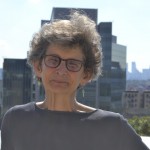
Marta Gutman
Associate Professor and Director of History & Theory
Spitzer School of Architecture, The City College of New York and The Graduate Center, CUNY
Marta Gutman, historian and licensed architect, coordinates the program in history and theory at the Spitzer School of Architecture at the City College of New York. She is also a member of the doctoral faculty in Art History at The Graduate Center/CUNY. In her writing and teaching, she examines ordinary buildings and neighborhoods, the history of cities, and issues of gender, class, race, and especially childhood as they play out in the everyday spaces, public culture, and social life of cities in the United States. She’s written about New York City’s WPA pools, showing how kids racially integrated them, and co-edited Designing Modern Childhoods: History, Space and the Material Culture of Children (Rutgers, 2008); her new book, A City for Children: Women, Architecture, and the Charitable Landscapes of Oakland, 1850-1950 (University of Chicago Press, 2014), was named a book of the year by Times Higher Ed—where it was called “a monumental work.” Dr. Gutman also co-edits Buildings & Landscapes: Journal of the Vernacular Architecture Forum.
Closing Keynote
Paola Berenstein Jacques
Director of Laboratório Urbano [Urban Laboratory]
Department of Architecture and Urbanism
Federal University of Bahia, Salvador, Brazil
Paola Berenstein Jacques works as a professor at the Architecture and Urbanism as well as the Visual Arts graduate programs at the Federal University of Bahia. She also works as a researcher for CNPq [National Council of Scientific and Technological Development], coordinating the Laboratório Urbano [Urban Laboratory] research group. She is the author of Les favelas de Rio (“Slums in Rio” – Paris, l’Harmattan, 2001); Estética da Ginga (“The Aesthetics of Sway” -Rio de Janeiro, Casa da Palavra, 2001); Esthétique des favelas (“The Aesthetics of the Slums” – Paris, l’Harmattan, 2003); co-author of Maré, vida na favela (“Maré, Life in the Slums” – Rio de Janeiro, Casa da Palavra, 2002), and the organizer of Apologia da Deriva (“An Apologetics of Drifting” – Rio de Janeiro, Casa da Palavra, 2003), Corps et Décors Urbains (“Urban Bodies and Decorations” – Paris, l’Harmattan, 2006), Corpos e cenários urbanos (“Urban Bodies and Sceneries” – Salvador, Edufba, 2006), and Corpocidade: debates, ações e articulações (“Corpocidade: debates, actions, and articulations” – Salvador, Edufba, 2010).
Fabiana Dultra Britto
Pro-Rector of Public Outreach
Federal University of Bahia, Salvador, Brazil
Fabiana Dultra Britto joined the Urban Laboratory of the Federal University of Bahia in 2008, where she coordinates research on aesthetics, the city, and the body. Britto directs the Corpocidade Platform (http://www.corpocidade.dan.ufba.br), which includes academic research and events, as well as the publication of the biennial journal Redobra (www.redobra.ufba.br). Britto is part of the research groups “PIRVE- L’aseptisation des ambiances pietonnes: la passivité et la plasticité des corps en marche” (http://www.marcheenville.ufba.br) and “MUSE – Les Enigmes sensibles des mobilités urbaines contemporaine,” both coordinated by Rachel Thomas (Laboratoire CRESSON-CNRS). Britto was a Postdoctoral Fellow in Public Art at the Bauhaus Universität Weimar (2009) and the Centre de Recherche sur L’Espace Sonore et L’Environnement Urbain – CRESSON-CNRS (2012). Her research focuses on dance theory, history, and criticism, as well as on processes that relate to the body, dance, and the urban context (coplasticidade and corpografia).
Artist Intervention
OPAVIVARÁ!
Art collective
Rio de Janeiro, Brazil
OPAVIVARÁ! is an art collective from Rio de Janeiro that develops actions in public spaces of the city, galleries and cultural institutions, offering inversions in the use of urban space through the creation of relational devices that provide collective experiences. Since its creation in 2005, the group has actively participated in the contemporary arts scene. Their goal is to create situations that activate and increase the power of life: how to drink and dance together, or celebrate any day gathered in the square, at the beach or on the street–celebrating carnival out of season, to increase its transformational power. Concentrated on the “anthropocene,” OPAVIVARÁ!’s works are a space that worships the non-productive and non-active and it stands as a counter proposition to our accelerated times. Their latest work, Formosa Decelerator, is a kind of sloth temple, a space that allows our accelerated daily routine to be stretched, opening up the path to a more organic, pleasurable and reflexive fruition of our environment as a counter to our accelerated, superficial and volatile times.
Conference Co-Organizers
Liz Donato
PhD Candidate, Art History
The Graduate Center, CUNY
edonato-at-gradcenter.cuny.edu
Liz Donato is a PhD Candidate in art history at the Graduate Center. Her research focuses on midcentury architectural modernisms in Latin America, emphasizing cross-disciplinary practices and pedagogy. Her dissertation examines the surrealist currents in the experimental pedagogy of the Valparaíso School against the backdrop of modernizing urban landscapes in postwar South America. Donato was formerly a Graduate Teaching Fellow at the City College of New York, and teaches undergraduate courses in 20th century Latin American art and architecture at City College and Parsons The New School of Design. She has presented her research at the University of Texas at Austin, the Museum of Fine Arts, Houston and the Latin American Studies Association.
Mya Dosch
PhD Candidate, Art History
The Graduate Center, CUNY
mdosch-at-gradcenter.cuny.edu
Mya Dosch is a PhD candidate in art history at The Graduate Center of the City University of New York. Her dissertation considers artistic and architectural negotiations of the 1968 student movement in Mexico City, from monumental installations to ephemeral urban interventions. Dosch was the recipient of a Beinecke Fellowship for Graduate Study in the Humanities. She currently teaches undergraduate courses in Latin American art at Brooklyn College and City College.
Luisa Valle
PhD Student, Art History
The Graduate Center, CUNY
lvalle-at-gc.cuny.edu
Luisa Valle is a PhD student in art history at The Graduate Center of the City University of New York. Her research focuses on Latin American architecture and its implications for the art production from the region. Drawing on spatial theory, urban epistemology, and post-colonial theory, she investigates spatial practices and architectural installations as works that concomitantly build on and challenge the official narrative of modernist architecture in the region. Focusing on the temporality, precariousness, and participatory strategies of these “architectures” she explores how art re-evaluates and yet continues to use architecture as a tool in the struggle for social emancipation, active participation, and the ongoing codification of Latin American cultural identities. Valle is a Graduate Teaching Fellow at Hunter College.



